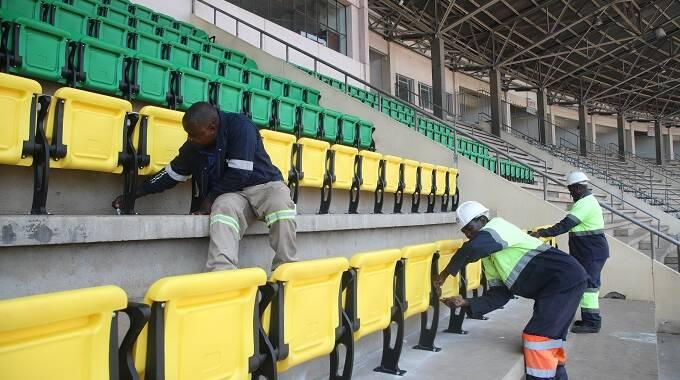News / Local
National Sports Stadium Revamp Gains Momentum with Bucket Seats Installation
22 Dec 2024 at 10:30hrs | Views

The installation of bucket seats at the National Sports Stadium (NSS) is well underway, signaling a critical step towards rehabilitating Zimbabwe's largest sporting venue. Once characterized by grey concrete terraces, the stadium is gradually transforming as contractors install vibrant seats in preparation for the return of international football.
The project, which began in earnest following the arrival of the first consignment of 30,000 bucket seats on November 30, has seen contractors working daily on the western terraces near the VIP section. Power outages have occasionally slowed progress, but the efforts are steady, with an additional 25,000 seats expected early next year.
These renovations are part of a broader partnership between the government and Sakunda Holdings, aimed at revamping the 37-year-old stadium. The 2024 National Budget allocated ZWL 189 million to complete the upgrades, ensuring the facility meets the stringent requirements set by the Confederation of African Football (CAF).
The NSS has been barred from hosting international matches since it was deemed non-compliant with CAF standards three years ago. The upgrades, which extend beyond seating, include a new water reticulation system, improved ablution facilities, electronic turnstiles, CCTV cameras, and enhanced dressing and medical rooms. The government is optimistic that these efforts will restore the stadium's eligibility to host international matches, including the remaining fixtures for Zimbabwe's 2026 FIFA World Cup qualifiers.
Meanwhile, similar renovations are underway at Rufaro Stadium in Harare. The Harare City Council, in partnership with Okima Plastics, has started installing bucket seats to bring the facility up to international standards. This initiative follows years of ineligibility for the venue, which has not hosted international matches for an extended period.
For the past three years, Zimbabwe's national teams have been forced to play home fixtures abroad, utilizing stadiums in Uganda and South Africa. The completion of these renovations will not only save logistical costs but also allow fans to support their teams on home soil.
As the transformation of the NSS and Rufaro Stadium progresses, the return of international football to Zimbabwe is becoming an achievable goal. The renovations symbolize more than just compliance with CAF standards—they represent a renewed commitment to improving the country's sports infrastructure and restoring its reputation on the global football stage.
The project, which began in earnest following the arrival of the first consignment of 30,000 bucket seats on November 30, has seen contractors working daily on the western terraces near the VIP section. Power outages have occasionally slowed progress, but the efforts are steady, with an additional 25,000 seats expected early next year.
These renovations are part of a broader partnership between the government and Sakunda Holdings, aimed at revamping the 37-year-old stadium. The 2024 National Budget allocated ZWL 189 million to complete the upgrades, ensuring the facility meets the stringent requirements set by the Confederation of African Football (CAF).
The NSS has been barred from hosting international matches since it was deemed non-compliant with CAF standards three years ago. The upgrades, which extend beyond seating, include a new water reticulation system, improved ablution facilities, electronic turnstiles, CCTV cameras, and enhanced dressing and medical rooms. The government is optimistic that these efforts will restore the stadium's eligibility to host international matches, including the remaining fixtures for Zimbabwe's 2026 FIFA World Cup qualifiers.
Meanwhile, similar renovations are underway at Rufaro Stadium in Harare. The Harare City Council, in partnership with Okima Plastics, has started installing bucket seats to bring the facility up to international standards. This initiative follows years of ineligibility for the venue, which has not hosted international matches for an extended period.
For the past three years, Zimbabwe's national teams have been forced to play home fixtures abroad, utilizing stadiums in Uganda and South Africa. The completion of these renovations will not only save logistical costs but also allow fans to support their teams on home soil.
As the transformation of the NSS and Rufaro Stadium progresses, the return of international football to Zimbabwe is becoming an achievable goal. The renovations symbolize more than just compliance with CAF standards—they represent a renewed commitment to improving the country's sports infrastructure and restoring its reputation on the global football stage.
Source - The Sunday Mail


























